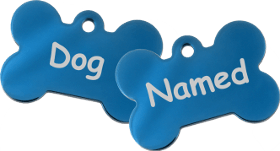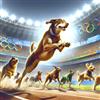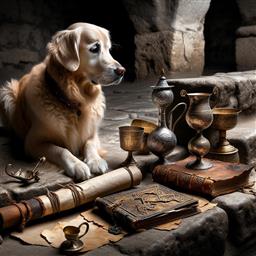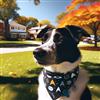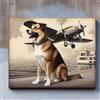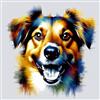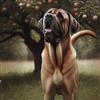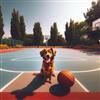9th Century Dog Names
Updated: May 27, 2024
Welcome to this unique and fascinating insight into the world of canine nomenclature from a bygone era. Our journey takes us back to the 9th century, a time rich in history and cultural transformations across the globe. It was during this period that the relationship between humans and dogs evolved significantly, with our canine companions moving from mainly working roles to becoming cherished pets.
Just as today, the names bestowed upon these dogs often held special meaning, reflecting not just their physical attributes, but also their character, the status of their owners, or even the hopes and aspirations for the dog's future. These monikers provide a captivating glimpse into what life was like during this ancient epoch, and the roles dogs played in society. As you explore these names, you will discover their historical context and the stories they tell about the people and cultures of the time.
This page is a treasure trove for dog owners, history enthusiasts, and anyone interested in the cultural significance of pet naming. These ancient tags have stood the test of time, with some still popular today, while others wait to be rediscovered. We invite you to delve into this intriguing collection and perhaps find the perfect historical name for your beloved pet.
| Name | Reason to Choose |
|---|---|
| Aethelflaed | Recognizes Aethelflaed, Lady of the Mercians and a strong female leader |
| Aethelred | Draws from Aethelred I, King of Wessex from 865 to 871 |
| Aldric | An Old German name that means 'old ruler', it was popular during the 9th century |
| Alfred | Named after Alfred the Great, King of Wessex |
| Algar | An Old English name that was popular in the 9th century |
| Anselm | Common name among bishops of the era |
| Arius | Named after Arius, a 9th-century theologian |
| Arnulf | Echoes Arnulf of Carinthia, a Holy Roman Emperor |
| Aslaug | Tribute to Aslaug, a legendary queen consort in Norse mythology |
| Baldwin | Tribute to Baldwin I, the first Count of Flanders |
| Basil | Inspired by Basil I, the Byzantine Emperor |
| Beorhtwulf | Named after Beorhtwulf of Mercia, a powerful king |
| Berengar | Echoes the name of Berengar I of Italy |
| Berthold | A Germanic name that means 'bright ruler' |
| Birger | Inspired by Birger Brosa, a powerful Jarl of Sweden |
| Bjorn | Named after Bjorn Ironside, a legendary Viking |
| Bodo | A Germanic name that was common in the 9th century |
| Boris | Honors Boris I of Bulgaria, a Christianizing ruler |
| Bruno | A common name in the 9th century, often associated with strength and nobility |
| Canute | Tribute to Canute the Great, a king of Denmark, England, and Norway |
| Cedric | An Old English name that was common in the 9th century |
| Charlemagne | Honors Charlemagne, a powerful and influential king |
| Clement | The name of several Popes and saints of the time |
| Conrad | A Germanic name that was popular in the 9th century |
| Cyril | Celebrated missionary who was active during the 9th century |
| Dietrich | A Germanic name that was common in the 9th century |
| Drogo | A Germanic name that means 'carry', it was popular during the 9th century |
| Dunstan | Archbishop of Canterbury in the late 9th century |
| Eadred | A common name in England during the 9th century |
| Eadric | An Old English name that was popular in the 9th century |
|
Suggest:
|
Submitted!
|
| 1 2 3 4 5 6 | |
9th Century Geographic Dog Names
| Name | Description |
|---|---|
| Abbasid | Named after the Abbasid Caliphate, which was a significant Islamic dynasty in the 9th century |
| Aghlabid | A dynasty ruling North Africa and Sicily in the 9th century |
| Alfred | King Alfred the Great defended England against Viking invasion in the 9th century |
| Asturias | The Kingdom of Asturias in Spain was prominent in the 9th century |
| Baghdad | During the 9th century, Baghdad was the capital of the Islamic world |
| Borobudur | It's the name of a famous 9th-century Buddhist temple in Java |
| Britannia | This name points to Britain, a region that experienced Viking invasions in the 9th century |
| Byzantium | It's the name of the Eastern Roman Empire's capital, a prominent entity in the 9th century |
| Caledonia | Roman name for Scotland which was a significant region during the 9th century |
| Charlemagne | From the Frankish king, who had great influence over Europe in the early 9th century |
| Cordoba | Named after a Spanish city that thrived during the 9th century under Moorish rule |
| Damascus | The city of Damascus was an important center of culture and power in the 9th century |
| Danelaw | This term refers to a historical region of England that was dominated by Danish law during the 9th century |
| Eboracum | The Roman name for York, a city in England that was a significant Viking base in the 9th century |
| Frankia | The Frankish kingdom was a dominant power during this time |
| Lindisfarne | This island was famously attacked by Vikings in the 9th century |
| Lombard | The Lombards were a Germanic people who ruled over the Kingdom of Italy during the 9th century |
| Lothar | Named after Lothair I, a Frankish king in the 9th century |
| Mercia | One of the kingdoms in the Heptarchy of Anglo-Saxon England |
| Nile | Egypt was a significant region during the 9th century, and the Nile is its lifeblood |
| Norse | Inspired by the Norsemen who were significant in this era |
| Pictish | The Picts were a group of Celtic-speaking people who lived in what is now eastern and northern Scotland during the 9th century |
| Rus | Referencing the Kievan Rus, a federation of East Slavic tribes in Europe from the late 9th century |
| Saracen | This term was used by the Romans in the 9th century to refer to Arab Muslims |
| Viking | It draws from the seafaring warriors who were prominent during the 9th century |
|
Suggest:
|
Submitted!
|
9th Century Historical Figure Dog Names
| Name | Description |
|---|---|
| Æthelred | Æthelred was a ninth-century king of Wessex |
| Alfred | This name is inspired by Alfred the Great, a significant English king in the 9th century |
| Ansgar | Ansgar was a missionary who spread Christianity in Denmark and Sweden in the 9th century |
| Arnulf | Arnulf of Carinthia was a significant Carolingian king in the 9th century |
| Baldwin | Baldwin I was a prominent figure in the 9th century, serving as the first count of Flanders |
| Basil | Basil I, a Byzantine Emperor, reigned in the 9th century |
| Boris | Boris I of Bulgaria was a significant ruler in the 9th century |
| Charlemagne | He was a powerful king during the 9th century, ruling the Carolingian Empire |
| Eberhard | Eberhard was a significant duke in Franconia during the 9th century |
| Egbert | Egbert of Wessex was an influential figure in 9th century England |
| Ethelwulf | Ethelwulf was a king of Wessex in the 9th century |
| Gorm | Gorm the Old was a Danish king during the 9th century |
| Guthrum | Guthrum was a Viking leader who became a king in the 9th century |
| Harald | Harald Fairhair is recognized as the first King of Norway in the 9th century |
| Igor | Igor of Kiev was a prominent Russian ruler during this period |
| Lothair | Lothair I was an influential king and emperor of the Carolingian Empire |
| Louis | Louis the Pious was a notable Emperor of the Carolingian Empire in the 9th century |
| Ludwig | The German name of Louis the German, a ninth-century king of East Francia |
| Odo | Odo was the first king of the western part of Francia in the ninth century |
| Otto | Otto I was a German king who ruled in the 9th century |
| Pepin | Pepin II was a Carolingian king in the 9th century |
| Photius | Photius was a notable figure in the Byzantine Empire during the 9th century |
| Rurik | Rurik was the founder of the Rurik Dynasty in Russia during the 9th century |
| Simeon | Simeon I of Bulgaria was an influential ruler during the 9th century |
| Wiglaf | Wiglaf was a prominent king of Mercia in the 9th century |
|
Suggest:
|
Submitted!
|
9th Century Mythological Dog Names
| Name | Description |
|---|---|
| Baldr | For Baldr, the Norse god of light and purity, often associated with benevolent animals |
| Bragi | Bragi was the god of poetry in Norse mythology |
| Eir | Eir was the goddess of healing in Norse mythology |
| Fenrir | Fenrir was a monstrous wolf in Norse mythology |
| Forseti | Forseti was the god of justice, peace, and truth in Norse mythology |
| Freyja | After Freyja, the Norse goddess of love, beauty, and fertility, who had a fondness for animals |
| Frigg | Frigg was the queen of the Æsir and the goddess of the sky in Norse mythology |
| Garm | Garm was a blood-stained watchdog that guarded Hel's gate in Norse mythology |
| Hati | Hati was a mythological wolf who chased the moon |
| Heimdall | After the god Heimdall, guardian of the Norse gods, symbolic of protection |
| Hodur | Hodur was a blind god tricked into killing his brother Baldr in Norse mythology |
| Hugin | Odin's other raven, symbolizing the mind and wisdom |
| Idun | Idun was the goddess of spring and rejuvenation in Norse mythology |
| Loki | For Loki, the trickster god who could shape-shift into animals |
| Munin | One of the two ravens of Odin, representing memory and thought |
| Nanna | The wife of Baldr, a goddess associated with familial love and protection |
| Njord | Njord was the god of the sea and seafaring in Norse mythology |
| Odin | After the powerful Norse god, believed to have canines as companions |
| Sif | Sif was a goddess associated with earth, family, and harvest in Norse mythology |
| Skoll | Skoll was a wolf in Norse mythology that chased the sun |
| Thor | Named for the Norse god of thunder, often depicted with wolves |
| Tyr | The Norse god of war, often associated with bravery and courage |
| Ullr | Ullr was the god of hunting, archery, and skiing in Norse mythology |
| Vali | Vali was the god of eternal light in Norse mythology |
| Vidar | Vidar was the god of vengeance in Norse mythology |
|
Suggest:
|
Submitted!
|
9th Century Literature Dog Names
| Name | Description |
|---|---|
| Alfred | Inspired by Alfred the Great, a key figure in 9th century literature |
| Bede | Named after the 9th century historian and scholar Bede |
| Beowulf | An epic Old English poem of the 9th century |
| Brunhild | A major character in the 9th century epic 'Nibelungenlied.' |
| Caedmon | Named after Caedmon, the earliest English poet whose name is known |
| Charlemagne | A Frankish king, his reign and tales are often referenced in 9th century literature |
| Cynewulf | An Anglo-Saxon poet from the 9th century |
| Dietrich | From 'Dietrich von Bern,' a hero of several Old High German heroic epics |
| Egbert | Named after Egbert of Wessex, an important character in 9th century literature |
| Euric | Named after Euric, a Visigothic king often mentioned in 9th century literature |
| Hildebrand | Inspired by the epic poem 'Hildebrandslied.' |
| Iseult | From the tragic love story of Tristan and Iseult |
| Kriemhild | A heroine from the 9th century epic 'Nibelungenlied.' |
| Ludwig | Named after Ludwig the German, an important figure in 9th century literature |
| Nibelung | From the 'Nibelungenlied,' a 9th century Germanic epic |
| Odin | A major god in Norse mythology, often mentioned in 9th century literature |
| Ragnar | Inspired by Ragnar Lodbrok, a legendary Norse hero |
| Siegfried | The hero of the 9th century epic 'Nibelungenlied.' |
| Tristan | A Cornish hero of a famous 9th century tale |
| Uther | From Uther Pendragon, King Arthur's father, often mentioned in 9th century literature |
| Valkyrie | Female figures who choose who will die in battle, often mentioned in 9th century Norse sagas |
| Wessex | Named after the Kingdom of Wessex, a setting of many 9th century tales |
| Xanten | From the 'Nibelungenlied' where it is Siegfried's hometown |
| Ymir | A primeval being born of primordial elemental poison and a key figure in Norse mythology |
| Zephyrus | The Greek god of the west wind, often mentioned in 9th century literature |
|
Suggest:
|
Submitted!
|
9th Century Royal Dog Names
| Name | Description |
|---|---|
| Alfred | Alfred the Great ruled in the 9th century. This name would honor his leadership |
| Arnulf | Arnulf of Carinthia was a king of East Francia, a name for a dog of strong character |
| Baldwin | Baldwin was a common name among the Frankish nobility, suitable for a noble hound |
| Berengar | Berengar was a king of Italy, a name for a dog with a regal bearing |
| Boris | Boris I was a Bulgarian ruler, a name for a powerful, sturdy dog |
| Charlemagne | This name is taken from a renowned king of the Frankish Empire |
| Constantine | A name after Constantine VII, a Byzantine emperor, perfect for a dog with a majestic presence |
| Eadweard | Eadweard was an Anglo-Saxon name, suitable for a loyal and brave dog |
| Eberhard | Eberhard was a Duke of Friuli, a name for a dog that is brave and strong |
| Egbert | Egbert was the name of an Anglo-Saxon king. It would be fitting for a regal canine |
| Ethelwulf | An Anglo-Saxon king's name, suitable for a strong, bold dog |
| Godfrey | Named after Godfrey, the Duke of Friuli, a name for a strong, protective dog |
| Harald | Harald Fairhair was a Norwegian king, a name for a beautiful, fluffy dog |
| Ivar | Taken from Ivar the Boneless, a Norse king, perfect for a fearless dog |
| Lambert | Lambert was a name of several medieval rulers, a name for a dog with an impressive stature |
| Lothar | Lothar was a common name among Frankish kings, a name for a loyal, brave dog |
| Louis | Louis the Pious was a Frankish king, a name for a loyal, obedient dog |
| Ludwig | Ludwig was a common royal name in Germanic territories, suitable for a regal pet |
| Oleg | Oleg was a Varangian prince, a name for a noble and brave dog |
| Otto | Otto was a common name among Germanic rulers, a name for a dog with a strong, noble character |
| Pepin | Pepin was a name common among Frankish kings, suitable for a courageous dog |
| Ragnar | Ragnar Lodbrok was a legendary Norse ruler, a name for a brave canine |
| Rurik | Rurik was a Varangian chieftain, a name for a dog with strong leadership qualities |
| Simeon | Simeon I was a Bulgarian ruler, a name for a wise, intelligent dog |
| Svatopluk | Svatopluk was a Moravian ruler, a name suitable for a protective dog |
|
Suggest:
|
Submitted!
|
User Submitted Images
There are currently no user submitted images for this page. This is your opportunity to be the first! Submit your photo below.
User Recommendations
There are currently no name recommendations for this page. This is your opportunity to be the first! Make your recommendation below.
Recently Updated
We would like to take this time to thank all of our visitors that make DogNamed.com the best dog naming resource on the web. Our site would not be where it is today without your suggestions, ratings, and photo submissions. So pat yourselves on the back for a job well done and keep up the good work! If you have any comments, suggestions, or ideas for the this page or any part of our site, don't hesitate to drop us a line on our Contact Page. Thank you! -The DogNamed Team
